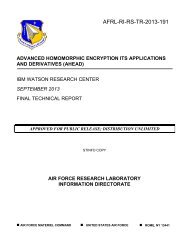EN100-web
EN100-web
EN100-web
You also want an ePaper? Increase the reach of your titles
YUMPU automatically turns print PDFs into web optimized ePapers that Google loves.
Keynote<br />
e-Infrastructures<br />
Enabling trust in the Era<br />
of Data-Intensive Science<br />
The World Wide Web is a global communication platform<br />
transforming research and education. The data-driven paradigm,<br />
although in different contexts, affects all fields of science.<br />
New scientific methods are emerging supported by<br />
unprecedented ability to move data around and the capacity<br />
to process them even in extreme large volumes . Trust in the<br />
scientific enterprise builds on evidence-based methods and<br />
mechanisms of peer review and scrutiny. This has been<br />
working well for centuries involving more or less homogeneous<br />
groups of scientists. But if trust is a fundamental and<br />
time invariant value of science, it has to scale in order to preserve<br />
it in a hyper connected world. It has to take into<br />
account multidisciplinary approaches, citizens’ growing scientific<br />
literacy and their engagement in science. The Web<br />
obliges us to reflect and put in place a framework for <strong>web</strong>s of<br />
trust. In order to scale, a trust-enabling framework has to get<br />
the acceptance of the wider research communities, incorporating<br />
incentives to push further frontiers of knowledge. It<br />
has to promote a culture of transparency supporting reproducibility<br />
of experiments for well-founded review. It should<br />
take into account established good practices and traditions<br />
which differ across scientific communities. The European<br />
Commission (EC) has been working on a framework of open<br />
science addressing in particular the impact from data, computing<br />
and networking infrastructures. Important steps were<br />
taken when launching Horizon 2020.<br />
Open Science<br />
As proposed in the “Open Science for the 21st century” declaration<br />
, open science can be unfolded in three components:<br />
open cultures, open content and open infrastructures. From<br />
the perspective of trust building, open science envisages<br />
optimal sharing of research data and also publications, software,<br />
and educational resources. The potential to mash-up,<br />
and to re-use research datasets will not only enable accurate<br />
scrutiny but will also reveal unexpected relationships and<br />
will trigger new findings. The European Commission is<br />
engaged to ensure an open access framework for publications<br />
stemming from EU-funded research and is progressively<br />
opening access to the research data (the basis for<br />
Horizon 2020). The EC is asking funding bodies in EU<br />
Member States to do the same.<br />
Open infrastructures and the Research Data Alliance<br />
(RDA)<br />
e-infrastructures are key components of the open science<br />
framework. They support advanced science and enable<br />
online research collaboration across disciplines at global<br />
level. They have the potential to structure the global knowledge<br />
space, increase scope, depth and economies of scale of<br />
the scientific enterprise. And, not least, they bridge the gap<br />
between scientists and the citizen and are enablers of trust in<br />
the scientific process. Data is a basic element of e-infrastructures.<br />
It has always been so but even more now at the dawn<br />
of “data-driven science” when e-infrastructures become a<br />
great opportunity for widening the participatory nature of<br />
Carlos Morais Pires,<br />
Scientific Officer at the<br />
European Commission,<br />
Excellence in Science<br />
DG/CONNECT.<br />
Carlos Morais Pires,<br />
coordinates the area of<br />
“Scientific Data<br />
e-Infrastructures” at the<br />
European Commission,<br />
DG CONNECT.<br />
science. The Riding the Wave and the Data Harvest reports<br />
highlight the strategic importance for Europe to support<br />
interoperability of research data infrastructures. They also<br />
point strongly at the need to support cost-effective research<br />
data management and the emergence of a computing literate<br />
generation of researchers in all fields of science. The<br />
European Commission is supporting the development of a<br />
pan-European multi-disciplinary data infrastructure through<br />
Horizon 2020 and policy developments centred on openness<br />
and interoperability. The global Research Data Alliance will<br />
support the EC strategy to achieve global scientific data<br />
interoperability in a way that real actors (users and producers<br />
of data, service providers, network and computing infrastructures,<br />
researchers and their organisations) are in the<br />
driving seat. Investments in digital infrastructure are needed<br />
to ensure that Europe remains a central hub for research and<br />
innovation, offering the best infrastructure to the brightest<br />
minds in the world.<br />
Final remarks<br />
Universality of science requires trusted and equitable access<br />
across all economic and social sectors. An open science<br />
framework will help fostering transparency and integrity and<br />
therefore trust in the scientific enterprise. An open<br />
science/open e-infrastructure framework should preserve the<br />
incentives of scientific discovery and the need to share and<br />
trust in order to collaborate across disciplinary and geographical<br />
boundaries, and also to develop the infrastructure<br />
capacity to support innovation. All stakeholders of the science,<br />
education and innovation “ecosystem” should promote<br />
practical applications of open science principles. For an open<br />
science framework to emerge the active contribution of<br />
many different players is necessary: from policy makers and<br />
funders to the individual researcher and ultimately to the<br />
engaged citizen. It requires a strong coordination effort at<br />
European and global levels and the promotion of global<br />
interoperability of data infrastructures through communityled<br />
initiatives such as the Research Data Alliance.<br />
Carlos Morais Pires<br />
Links:<br />
Riding the Wave Report: http://kwz.me/Df<br />
Data Harvest report: http://kwz.me/Dj<br />
Research Data Alliance: https://rd-alliance.org/<br />
Science as an open enterprise, The Royal Society Science<br />
Policy Centre, June 2012: http://kwz.me/Dq<br />
Open Science Declaration: http://kwz.me/Dv<br />
12<br />
ERCIM NEWS 100 January 2015



